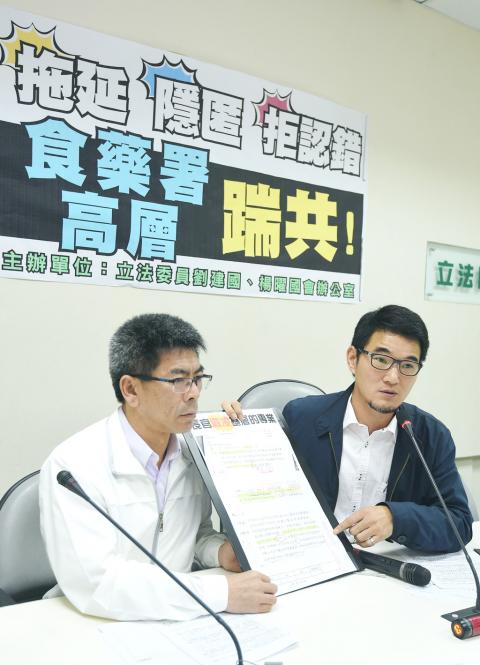Democratic Progressive Party (DPP) legislators yesterday accused the Food and Drug Administration (FDA) of a cover-up, showing copies of six official reports on illegal imports of radioactive food products that were rejected by ranking agency officials.
“Since March 4, an FDA specialist surnamed Ko (柯) and his supervisor, Huang Ming-kun (黃明坤), have filed at least six reports showing that some food products may have been illegally imported from areas in Japan where they may have been exposed to radioactive contamination,” DPP Legislator Liu Chien-kuo (劉建國) told a news conference cohosted by his colleague, Yang Yao (楊曜).
“However, all those reports were rejected by higher ranking officials in the agency. This makes us wonder if the FDA is deliberately trying to cover up the problem, while putting the nation’s food safety at risk,” Liu said.

Photo: Liu Hsin-de, Taipei Times
Since the nuclear disaster at Japan’s Fukushima Dai-ichi nuclear power plant in 2011, Taiwan has banned imports of food items from the surrounding areas, including Fukushima, Gunma, Ibaraki, Tochigi and Chiba prefectures.
According to the documents, Ko filed six reports — on March 4, 10, 16, 17 and 18 — and Huang approved them before forwarding them to higher officials.
In the reports, Ko said that a trading firm had illegally imported food items from the five prefectures, and asked that the FDA void the firm’s import license and issue a product recall.
However, the report was rejected four times by the agency’s regional administration center senior specialist, Wang Chen-yi (王貞懿), and once by the center’s deputy director, Wang Te-yuan (王德員), before it eventually reached center director Feng Jun-lan (馮潤蘭) on the sixth attempt.
While Feng approved the report, he put it aside and did not take action.
Pointing at the documents, Liu said that the supervisors even left notes and comments on the reports, such as “Where is the evidence” and “So what,” when they rejected it.
“On March 17, an official who did not sign his or her name circled the words ‘void’ and ‘destroy,’ and left a note saying that the two are ‘contradictory,’” Liu said.
“Well, the specialist was recommending that the [FDA] ‘void’ the company’s import license and ‘destroy’ products already on store shelves. I do not know what is the problem with the official who left the note,” the lawmaker said.
Moreover, after the illegal imports were exposed, it was Huang who was penalized.
“But he [Huang] was actually the one who found the problem and forwarded the report to his supervisor. What mistake did he make?” Liu asked.

The High Prosecutors’ Office yesterday withdrew an appeal against the acquittal of a former bank manager 22 years after his death, marking Taiwan’s first instance of prosecutors rendering posthumous justice to a wrongfully convicted defendant. Chu Ching-en (諸慶恩) — formerly a manager at the Taipei branch of BNP Paribas — was in 1999 accused by Weng Mao-chung (翁茂鍾), then-president of Chia Her Industrial Co, of forging a request for a fixed deposit of US$10 million by I-Hwa Industrial Co, a subsidiary of Chia Her, which was used as collateral. Chu was ruled not guilty in the first trial, but was found guilty

DEADLOCK: As the commission is unable to forum a quorum to review license renewal applications, the channel operators are not at fault and can air past their license date The National Communications Commission (NCC) yesterday said that the Public Television Service (PTS) and 36 other television and radio broadcasters could continue airing, despite the commission’s inability to meet a quorum to review their license renewal applications. The licenses of PTS and the other channels are set to expire between this month and June. The National Communications Commission Organization Act (國家通訊傳播委員會組織法) stipulates that the commission must meet the mandated quorum of four to hold a valid meeting. The seven-member commission currently has only three commissioners. “We have informed the channel operators of the progress we have made in reviewing their license renewal applications, and

‘DENIAL DEFENSE’: The US would increase its military presence with uncrewed ships, and submarines, while boosting defense in the Indo-Pacific, a Pete Hegseth memo said The US is reorienting its military strategy to focus primarily on deterring a potential Chinese invasion of Taiwan, a memo signed by US Secretary of Defense Pete Hegseth showed. The memo also called on Taiwan to increase its defense spending. The document, known as the “Interim National Defense Strategic Guidance,” was distributed this month and detailed the national defense plans of US President Donald Trump’s administration, an article in the Washington Post said on Saturday. It outlines how the US can prepare for a potential war with China and defend itself from threats in the “near abroad,” including Greenland and the Panama

Taiwan People’s Party (TPP) Chairman Huang Kuo-chang (黃國昌) yesterday appealed to the authorities to release former Taipei mayor Ko Wen-je (柯文哲) from pretrial detention amid conflicting reports about his health. The TPP at a news conference on Thursday said that Ko should be released to a hospital for treatment, adding that he has blood in his urine and had spells of pain and nausea followed by vomiting over the past three months. Hsieh Yen-yau (謝炎堯), a retired professor of internal medicine and Ko’s former teacher, said that Ko’s symptoms aligned with gallstones, kidney inflammation and potentially dangerous heart conditions. Ko, charged with